About Us
Social Welfare Inc. San-ikukai

San-ikukai was founded by volunteers at the Student YMCA of Tokyo Imperial University (currently the Student YMCA of Tokyo University) on March 16, 1918. At that time, many people were struggling to live due to the economic impact and social changes caused by World War I. The need for social work based on the Christian principle of 'love your neighbor as yourself' was discussed, and, beginning with free medical care for women and children, the present-day San-ikukai is involved with this.
San-ikukai always returned to its founding principles, even after being hit by two major disasters, the Great Kanto Earthquake and the Great Tokyo Air Raid.

Currently, we are expanding our facilities in Tokyo, Nagano, and Shizuoka to meet the diverse needs of those local communities. We have one hospital, two clinics, one nursing elderly rehabilitation facility, one nursing care clinic, three dementia support group homes, and four care houses. We also operate nine intensive-care nursing homes, with day nursing services, in-home support centers and other elderly home services, as well as two licenced nursery schools.
- Medical Care
- Elderly Welfare
- Child Welfare
Charter of SAN-IKUKAI
We were founded in March 1918 by people who burn with the love of Christian neighbors and aim for their practice.
The purpose was to protect, health and medical activities of ladies and children who were in need of special service at that time, but also to respond to the needs of society afterwards to general health care and elderly welfare We have expanded our service work to date.
Meanwhile, the things that flowed consistently and consistently in the 70-year history were the spirit of foundation.
SAN-IKUKAI reveal today that they have the following mission from the history and tradition as above.
We do all business based on the spirit of Christianity.
We will promote medical and welfare projects with the aim of improving and developing welfare society.
We will be self-sufficient, respond to changes in the social situation, actively address and carry out the required tasks.
March 19, 1988
Our Business

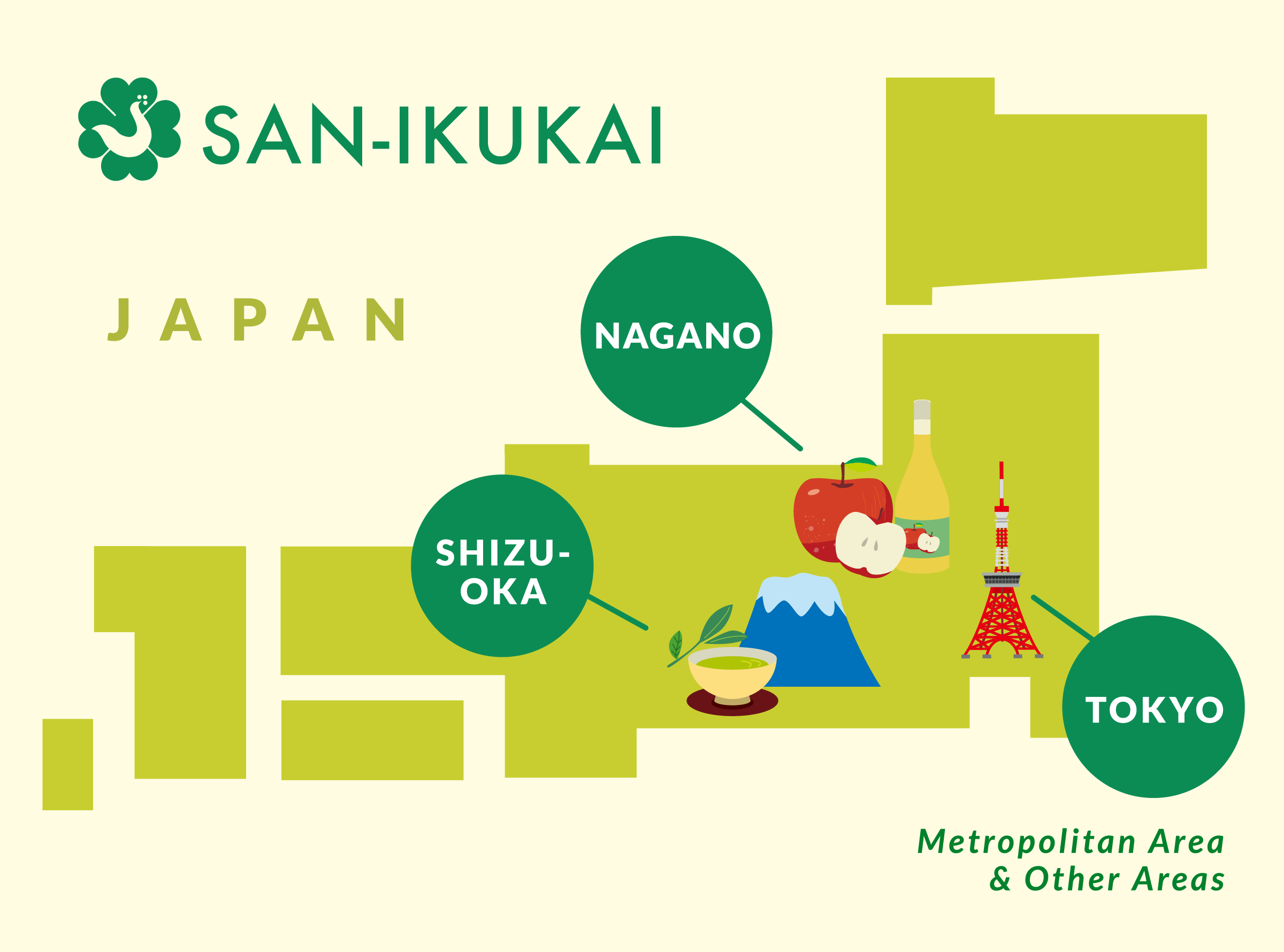
TOKYO
Metropolitan Area
-
- San-ikukai Hospital
-
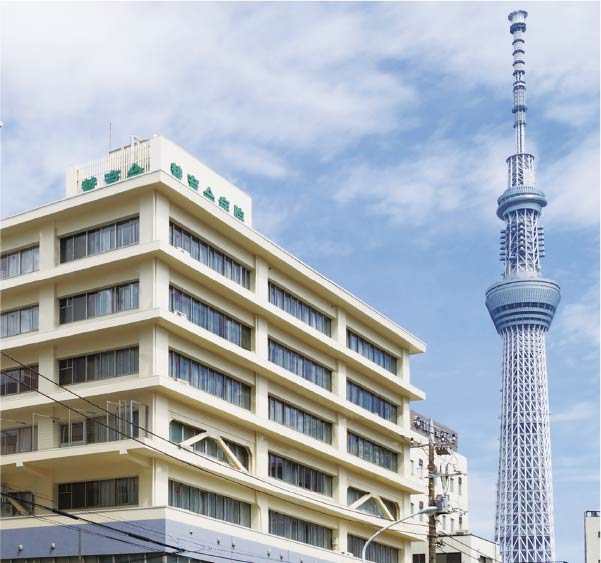
Medical Care
3-20-2 Taihei, Sumida-ku, Tokyo
- Facilities
-
Hospital with 199 beds (established in 1930)
Home Nursing Station (began in 1937)
Health Care Clinic (began in 1992)
- Hospital Departments
-
Obstetrics, Gynecology, Pediatrics, Internal Medicine, Surgery, Orthopedic Surgery, Otolaryngology, Ophthalmology, Dermatology, Urology, Anesthesiology
Palliative Care
Tokyo Regional Perinatal Mother and Baby Medical Center
Tokyo Designated Secondary Emergency Medical Institution (Internal Medicine, Surgery, Pediatrics)
- About the Facility
-
San-ikukai Hospital was founded in 1918 by the students and staff of the Student YMCA of Tokyo Imperial University. It provided free medical care based on the Christian faith for people living in downtown Eastern Tokyo. After its founding, the hospital established a midwifery and nursery clinic and has supported the births of over 330,000 babies in its century-long history. Currently, it holds parenting classes, provides midwife counseling rooms, and is involved in more than 1,100 births a year. Many times, we have seen the births of three generations.
Today, the San-Ikukai Hospital's medical treatment is mainly focused on perinatal and pediatrics, adult community-based medical care, and palliative care. The perinatal and pediatric departments function as a hospital that can provide advanced specialized medical care for mothers and babies both before and after childbirth. It has been recognized as a Regional Perinatal Mother and Baby Medical Center by the Tokyo metropolitan area and focuses on pediatric emergency treatment. Adult community medicine is a community-based acute phase hospital that provides medical care and inpatient treatment for internal medicine, surgery, orthopedics, gynecology, otolaryngology and ophthalmology. Terminal care provides medical care that allows patients to spend their days in peace towards the end of their lives, and supports people living in familiar neighborhood during that time.
San-ikukai aims to be a trusted hospital that provides true healing for people of all ages, from birth to death, cherishing the God-given lives of people residing mainly in the Sumida area.
-
- Tokyo Seifu-en
-
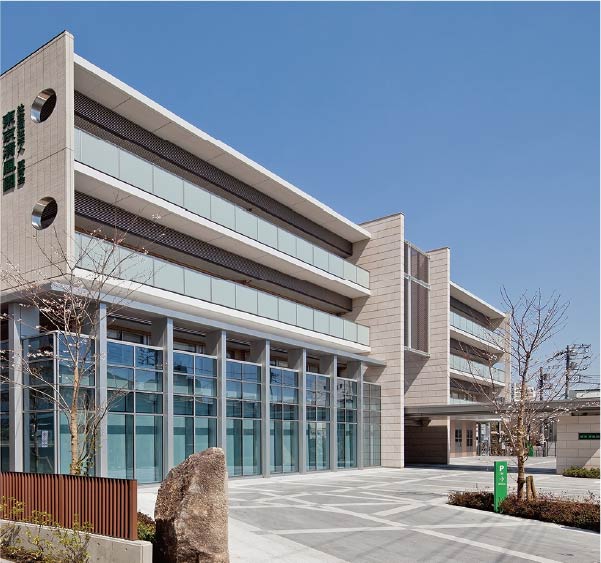
Elderly Welfare
1-25-12 Tachibana, Sumida-ku, Tokyo
- Facilities
-
Intensive-Care Nursing Home with 158 beds (opened in 1981)
Short Stay: 20 beds (began in 1982)
Day Service Center: 35 people/day (began in 1983)
In-Home Care Support Office (began in 2000)
Elderly Dementia Group Home: 18 beds (began in 2012)
Care House (Affordable Nursing Home): 20 beds (began in 2012)
- About the Facility
-
Tokyo Seifu-en is located on the grounds of the fomer Tachibana Elementary School, which holds profound memories where neighbors keep. Including the existing (multi-bed) intensive-care home, it is a large-scale 216-bed facility consisting of 100-bed units for special care, 20-bed units for short stays, a community-operated care house (which is an affordable nursing home), and a group home for elderly ones with dementia. Although the number of beds has increased, the majority of the rooms are private rooms. We have thus implemented "unit care" (small unit individual care) so that each resident can continue their own individual lifestyles.
One of the most essential parts of welfare facilities is to contribute to the improvement of community welfare. To promote community well-being, we manage the "San-iku Festival" (a regional festival) every year, which firstly forms friendships with the neibours and also brings attention to the history and work what San-ikukai is doing.
With the San-ikukai Hospital, the home nursing stations, and nursing facilities managed by San-ikukai, we support integration with the local community, other corporations, medical institutions, schools, councils, shopping areas, business and many more. In this way, we encourage neighbors to help each other in familiar communities.
-
- Hanamizuki Home
-
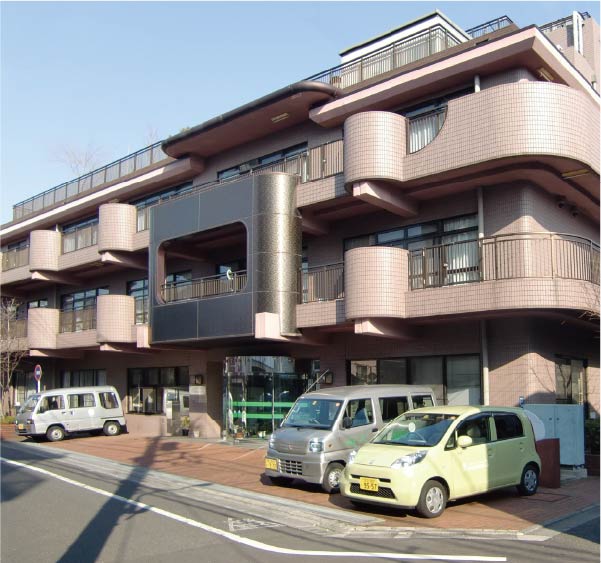
Elderly Welfare
3-22-14 Yahiro, Sumida-ku, Tokyo
- Facilities
-
Intensive-Care Nursing Home with 52 beds (opened in 1992)
Short-term Admissions: 4 beds (began in 1992)
Day Service Center: 52 people/day (began in 1992)
General Patients: 40 people/day, Dementia Patients: 12 people/day
Elderly Support Center (began in 2006)
Elderly Support Consultation Office (Sumida Ward Commissioned Service) (began in 2011)
Urban Affordable Nursing Home: 20 beds (began in 2012)
- About the Facility
-
The Hanamizuki Home was opened in 1992 at the request of the citizens as the first public intensive-care nursing home in Sumida Ward. It is a small housing facility with a 52-bed intensive care nursing home and a 4-bed short term admissions area. In addition, we are improving our facilities that support living in one's own home, including a day service center, an elderly support center, and the elderly support consultation office.
It is the desire of the Hanamizuki House staff that we are a "tender community that surpasses generations". To achieve this, we play a leading role outside our long-term care insurance services. We rent a tenement in the neighborhood to contribute to community activities and supply meals to local residents to help maintain health and socialisation. And, so that elderly people with dementia can enjoy their life peacefully with their families, we are working to create a communal space at a nearby shrine with other members of the community.
Additionally, San-iku Heights Higashi Sumida, an urban affordable nursing home established by San-ikukai in 2012, is only a 10-minute walk from Hanamizuki Home. We watch over and support the elderly in a familiar community setting where they can live a healthy and cheerful life, while reducing any financial burdens.
-
- Tachibana Home
-
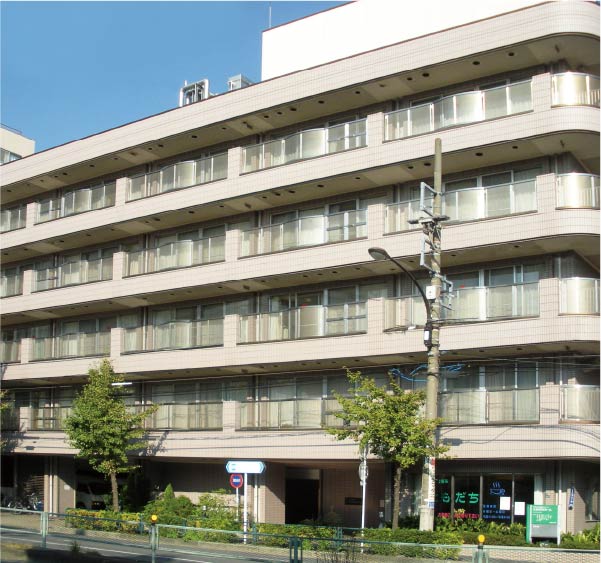
Elderly Welfare
3-10-1 Tachibana, Sumida-ku, Tokyo
- Facilities
-
Intensive-Care Nursing Home with 56 beds (opened in 1997)
Short-term Admissions: 6 beds (began in 1997)
Urban Affordable Nursing Home: 20 beds (began in 2017)
Elderly Support Center (began in 2006)
Elderly Support Consultation Office (Sumida Ward Commissioned Service) (began in 2009)
- About the Facility
-
Tachibana Home is a public facility privately operated by San-ikukai, commissioned by Sumida Ward. One characteristic of this facility is that it can offer highly independent care.
The 56-bed intensive-care nursing home and 6-bed short-term admissions are located in a five-storey building, with 10 to 18 people living on one floor. There are also 20 private rooms.
Since Tokyo Seifu-en is within walking distance, both facilities endeavor to operate in a unified manner through mutual use and training.
The second care house for San-ikukai, the urban affordable nursing home San-iku Heights Higashi Azuma, was opened 600 meters away (7 minutes' walk) in November 2017. We anticipate a lot of interaction between the facilities with events.
Since 2005, our facility has been pioneering the recruitment of foreign employees. Our aim is to be a place that foreign nursing staff can easily work at, while providing Japanese language learning support in cooperation with local NPO corporations.
-
- My Home Shinkawa
-
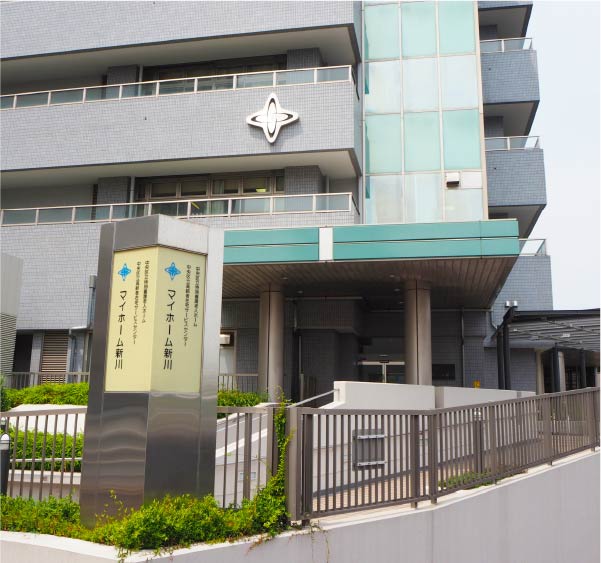
Elderly Welfare
2-27-3 Shinkawa, Chuo-ku, Tokyo
- Facilities
-
Intensive-Care Nursing Home with 80 beds (opened in 1995)
Short Stay: 8 beds
Day Service Center: 52 people/day
General Patients: 40 people/day, Dementia Patients: 12 people/day
In-Home Care Support Office
Home Nursing Station
Regional Comprehensive Support Center
- About the Facility
-
My Home Shinkawa was opened in 1995 as the second intensive-care nursing home in Chuo Ward.
This facility covers six levels – from the basement to the fifth floor – of a 35-storey high-rise apartment building with stunning views of the Sumida river. It operates an intensive-care nursing home, short stays (short-term admissions) and a day service center for elderly residents.
The in-home care support office and the home nursing station within our facility, commissioned by the ward, create care plans that facilitate the use of appopriate nursing care services at home. We also support the lives of elderly living at home by implementing our visiting home help services and providing peace-of-mind calls. In addition, we are responsible for the operation of the Local Comprehensive Support Center (an elderly consultation center) under the jurisdiction of the Tsukishima and Kachidoki regions. This makes available comprehensive welfare services for the elderly living in these areas.
Our staff are proud and happy to be able to help elderly people living in our facilities and within the community to continue living their lives the way each one wishes, in comfortable surroundings with their families and neighbors.
-
- San-iku Nursery Kiyosumi-Shirakawa
(established in 2011) -
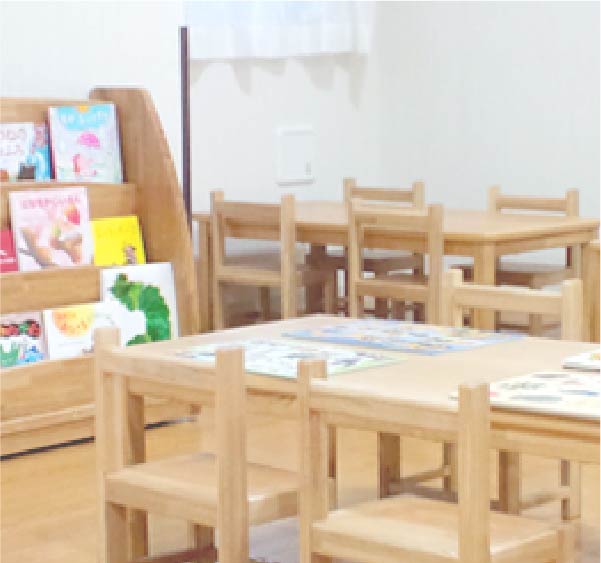
Child Welfare
Park House Kiyosumi-Shirakawa Tower 2F, 4-9-25 Shirakawa, Koto-ku, Tokyo
- Facilities
-
- Newborns: 9
- One year old: 16
- Two years old: 20
- Three years old: 20
- Four years old: 20
- Five years old: 20
- About the Facility
-
San-iku Nursery School Kiyosumi Shirakawa is an urban-style preschool located on the second floor of a 35-storey high-rise apartment building. Only 15 minutes from Tokyo Station by subway, Kiyosumi Shirakawa is close to Kiba (a thriving neighborhood since the Edo period) and children play in the vast Kiba Park.
With a view to the future of our children, we will nurture the lives and individualities of each God-given irreplaceable child under the principles of the Christian faith. We will draw close to and support them so that every single child can develop the way children need.
In early childhood, our childcare emphasizes forming relationships and attachments, so that time is spent with a sense of trust and security where the same nursery teacher cares for one baby.
In an era where most children don't have siblings due to the declining birthrate, we have also implemented "Childcare of mix age group", which emphasizes the relationship between different ages as an important part of the growth of a child's independence. Children become aware of their importance as seniors to other children and learn to be compassionate.
An overnight camp is held for five-year-olds. Leaving their parents and spending time with other children is a valuable experience for their growing sensitivity.
- San-iku Nursery Kiyosumi-Shirakawa
-
- San-iku Nursery Ariake
(established in 2015) -
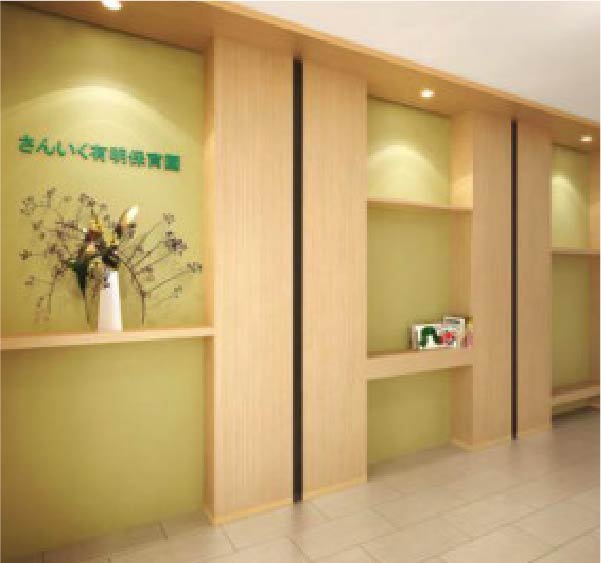
Child Welfare
Brillia Ariake City Tower 2F, 1-5-2 Ariake, Koto-ku, Tokyo
- Facilities
-
Newborns: 6 One year old: 15 Two years old: 16 Three years old: 18 Four years old: 18 Five years old: 18
Special Childcare: Extended-hours childcare (from age one and older), childcare for children with disabilities, emergency temporary childcare (at the request of Koto Ward)
- About the Facility
-
It is located on the second floor of a 33-storey high-rise apartment building in Ariake, within walking distance of the Ariake Coliseum and the International Exhibition Center. Many of the children live in the same building or in nearby apartments. There are also many children of foreign nationalities, which naturally aids in the nurturing of worldly children.
In the nursery school, the same nursery teacher takes care of one baby during their infancy. For ages three and up, classes encourage interaction between different ages, and our childcare endeavors to develop rich sensitivities such as love and trust through relationships with others. Furthermore, we nurture the inquisitive spirit and sensitivity of each preschooler, and proactively challenge them by developing a range of possibilities. We aim to provide childcare that focuses on twenty or thirty years into the child's future.
We are working to enhance our nutritional education programs. In the home, children have many opportunities to experience processed products, but not many chances to come into contact with raw ingredients. By touching, preparing and eating these ingredients, children learn that these things nourish us, empower us and provide us with life. We thus are implementing childcare that encourages gratitude and broadens a child's interests. Five-year-olds will leave their parents for a two-day camp and spend time with their friends. This is the first step towards independence and is an opportunity to develop non-cognitive skills including self-reliance, self-control, and self-confidence, along with cooperativeness, sympathy, kindness, and a sense of duty.
- San-iku Nursery Ariake
TOKYO
Other Areas
-
- Seifu-en
-
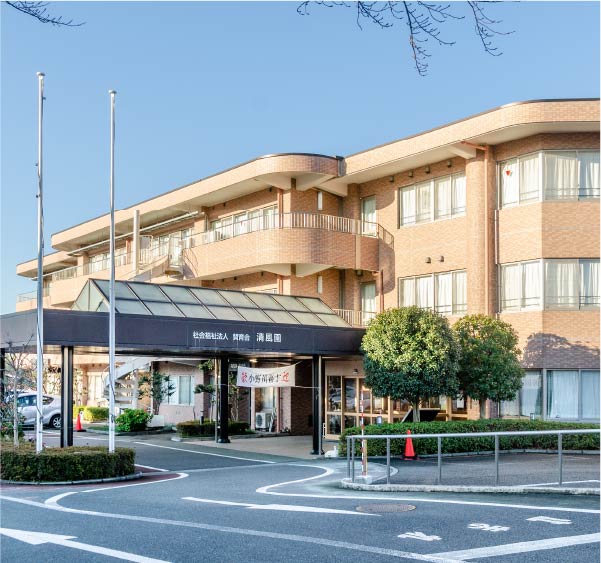
Elderly Welfare
7-17-13 Kanai, Machida-shi, Tokyo
- Facilities
-
Intensive-Care Nursing Home with 110 beds (opened in 1964)
Short Stay: 3 beds
Day Service Center General Patients: 30 people/day
Dementia Elderly Group Home: 9 people
Helper Station
Home Nursing Station
Infirmary
Serviced Elderly Residences: 43 homes (established in 2016)
- About the Facility
-
Seifu-en was created in 1964 (the year after the Elderly Welfare Act was established) as the second intensive-care nursing home within Tokyo.
Located halfway between Tokyo and Yokohama, Machida is a large suburban city.
Seifu-en has played a leading role in elderly care since the days before the start of the long-term care insurance system, through responding to local needs. This has included providing independent facilities for food distribution, assisted bathing, and dementia day services.
The clinical and in-home services that Seifu-en supplies are pivotal to the comprehensive community care system that our country seeks and is also a base for town development where people can live with peace of mind. We provide a 24-hour service called "Home Visit Station Seifu-en" so that nurses and caregivers can visit homes when nursing care is needed. Additionally, a service-oriented housing for the elderly, Seifu Hills Kanai, was set up on the adjacent land, and supports a variety of lifestyles.
In 2014, celebrating our 50th anniversary, we started working on the Niko Niko Seifu Cafeteria (a children's cafeteria) and child support projects. Children are now able to stop by and share happy times with people regardless of age,
Our mission is to walk side-by-side with the local community in response changing times and to help every resident achieve their hopes and dreams of living the way they desire until the end of their lives.
-
- Dai-ni Seifu-en
-
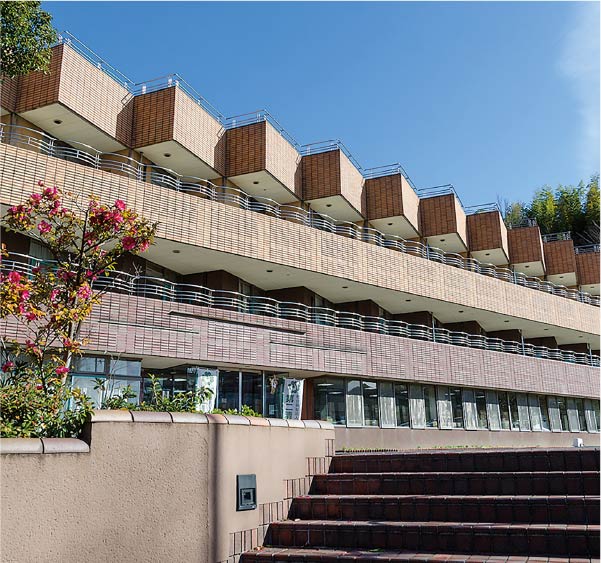
Elderly Welfare
3-270-1 Yakushidai, Machida-shi, Tokyo
- Facilities
-
Intensive-Care Nursing Home with 100 beds (opened in 1997)
Short Stay: 30 beds
Day Service Center: 77 people/day
General Patients: 50 people/day, Dementia Patients: 12 people/day, Prevention Patients: 15 people/day
In-Home Care Support Office
Elderly Support Center
Rental Housing for the Elderly
- About the Facility
-
Dai-ni Seifu-en was opened in April 1997. It is about 2 km away from Seifu-en.
Since its establishment, it has been referred to as "Dai-ni Seifu-en in times of trouble", and we have continued to accept patients who are difficult to accept at other facilities as much as possible.
All of our staff take dementia support training courses, and we continuously hold recurrent training on "Humanitude Care" to gain a high level of expertise and service manners.
Together with our full-time doctors, we are working to become known as "Dai-ni Seifu-en for dementia care".
We are also working hard on implementing the "community service" ideals of San-ikukai by cooperating with the local residents, locally owned playgroups and the Machida Philharmonic Orchestra. With these connections, Seifu-en works at community and social contribution projects.
NAGANO
-
- San-ikukai Clinic /
Toyono Nursing Care Clinic -
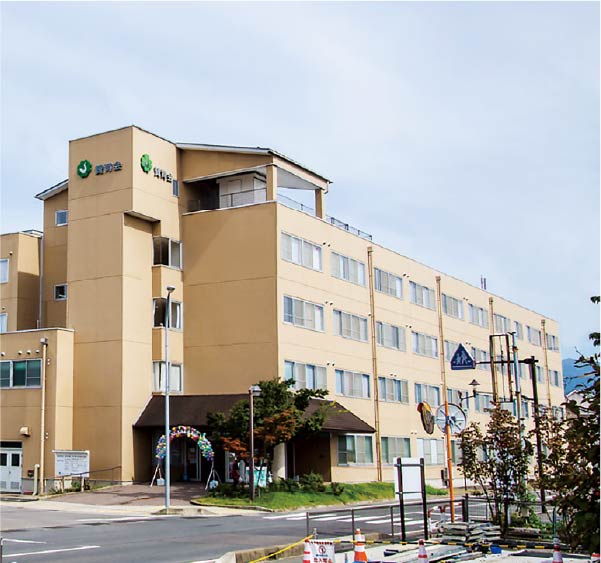
Medical Care
634 Toyono, Toyono-cho, Nagano-shi, Nagano
- Facilities
-
Toyono Nursing Care Clinic: Long-Term Care Insurance Patients: 60 beds (opened in March 2019, converted from Toyono Hospital)
In-Home Nursing Station Toyono (established in 1996)
San-ikukai Clinics: Internal Medicine, Pediatrics, Surgery, General Medicine, Orthopedic Surgery, Dermatology, Home-Care, In-Home Rehabilitation, Medical Checkups, Physical Exams, Vaccinations
- About the Facility
-
The opening of the Toyono Hospital, our predecessor, was planned as an evacuation spot from Tokyo, which turned into scorched earth during World War II. From 1947, it continued planning to provide medical care to post-war Toyono, which had no clinics and no doctors at the time. After that, the emphasis shifted from acute care to geriatric care with the aging of the community.
In addition to taking over outpatient care at Toyono Hospital, the San-ikukai Clinic has also contributed to enhancing medical care at each facility within Toyono and thus reducing the number of inpatients.
The Toyono Nursing Care Clinic is "a place for daily life", a new type of nursing establishment with medical, nursing care, and daily life facilities. The Nursing Care Clinic was implemented in 2018 for those who have completed treatment in general wards and are still in need of ongoing medical care. We supply medical and nursing services to those who have difficulty living at home and work hard with local residents to provide these same services to support a full way of life.
- San-ikukai Clinic /
-
- Toyono Seifu-en
-
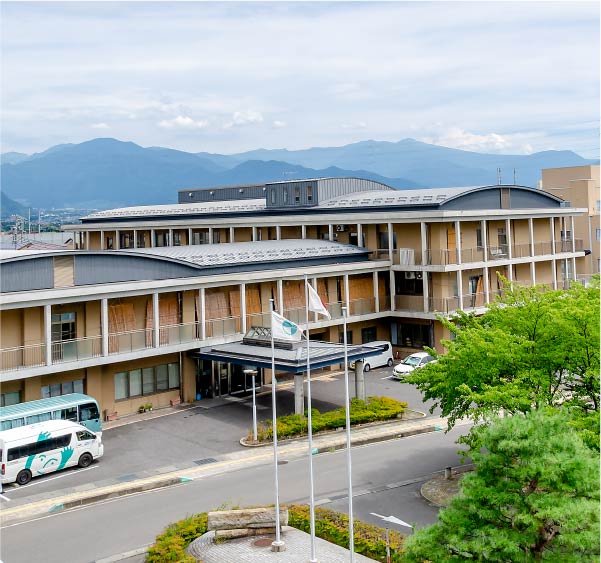
Elderly Welfare
659-1 Toyono, Toyono-cho, Nagano-shi, Nagano
- Facilities
-
Intensive-Care Nursing Home with 74 beds (opened in 1970)
Short Stay: 16 beds
Day Service Center
General and Preventative Patients: 35 people/day
Care House (Affordable Nursing Home): 18 beds
In-Home Care Support Office
Helper Station
- About the Facility
-
Toyono Seifu-en was established in 1970 as the first intensive-care nursing home in the Hokushin area. Along with Yutakano, the Toyono Nursing Care Clinic and the San-ikukai Clinic, we play a central role in the community through comprehensive health, medical care and social services.
In order to serve as a type of community safety net in the final stages of life, our doctors, nurses, and caregivers work together on study sessions, staff training and with families to deepen their understanding of terminal nursing care. Together with the San-ikukai Clinic, Toyono Nursing Care Clinic and Yutakano, we play a central role in comprehensive community welfare.
-
- Yutakano Rehabilitation Center
for the Elderly -
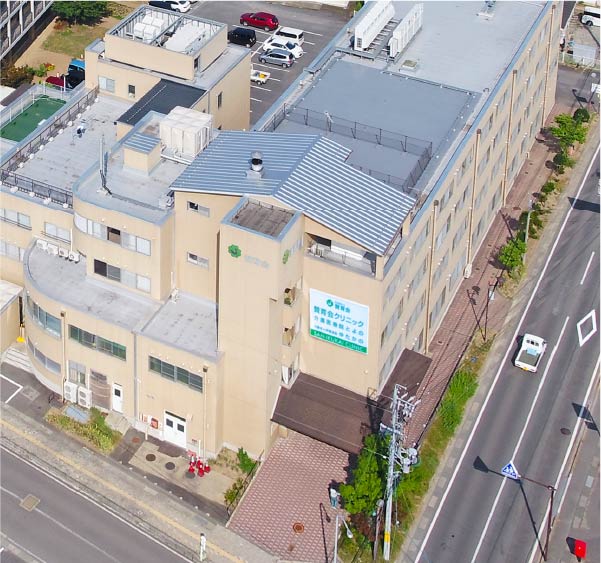
Elderly Welfare
634 Toyono, Toyono-cho, Nagano-shi, Nagano
- Facilities
-
Rehabilitation Facility for the Elderly (including Short Stays): 96 beds (began in 1991)
Day Rehabilitation: 20 people/day
- About the Facility
-
The establishment of Yutakano is closely related to that of the (former) Toyono Hospital.
Yutakano is the first and only rehabilitation facility for the elderly under the San-ikukai corporation.
All the functions of these facilities - the elderly and community-focused medical care of the San-ikukai Clinic and the Toyono Nursing Care Clinic, the eldercare of Toyono Seifu-en, and the rehabilitation services at Yutakano - are connected to supply comprehensive services to local residents.
Yutakano is working to support the elderly returning home. It plays a central role in building a comprehensive and continuous support system for patients and their families by making effective use of in-home services and local resources so that they can live in familiar surroundings no matter their age. At the same time, we are promoting the enhancement and expansion of our day rehabilitation services.
- Yutakano Rehabilitation Center
SHIZUOKA
-
- Tokai Clinic
-
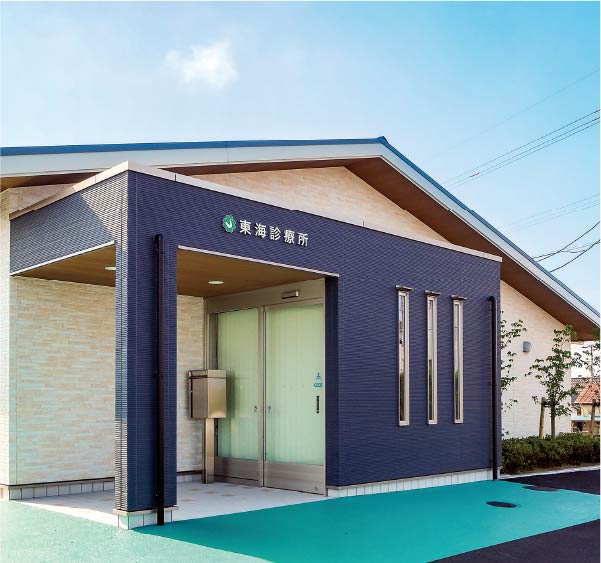
Medical Care
4090-1 Ikeshinden, Omaezaki-shi, Shizuoka
- Facilities
- Departments: Internal Medicine, Surgery, Urology, Dermatology
- About the Facility
-
The Tokai Clinic is in a stunning location with views of Mt. Fuji over the vast Pacific Ocean and Suruga Bay from the nearby Hamaoka Sand Dunes.
The history of the Tokai Clinic began in 1971. The Tokai Hospital, which was established as the first general hospital in the region and has up to 140 hospital beds, was its predecessor. Since then, with the establishment of public hospitals, and from 1985 we have continued to operate as the bed-free medical institution Tokai Clinic.
In the Omaezaki area with an aging population and a shortage of doctors, it is necessary to work as a medical facility catering to higher foot traffic, as well as general outpatient and specialised medical care. In June 2019, we renewed both our buildings and staff, starting along a new path of community health care. We will expand our activities with Tokai Seifu-en and home businesses on the basis of the keyword "cooperation".
-
- Tokai Seifu-en
-
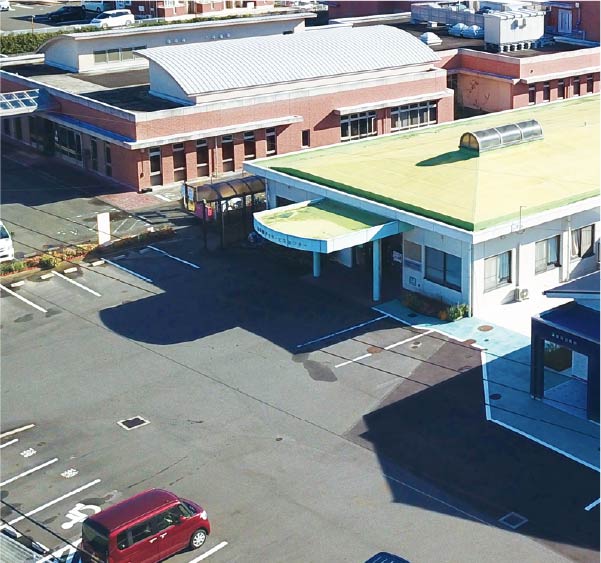
Elderly Welfare
4094 Ikeshinden, Omaezaki-shi, Shizuoka
- Facilities
-
Intensive-Care Nursing Home with 170 beds (opened in 1971)
Short Stay: 8 beds
Ikeshinden Day Service Center: 50 people/day
General and Preventive Patients: 30 people/day, Dementia Patients: 20 people/day
Sakura Day Service Center
General type and Preventive Patients: 25 people/day, Dementia Patients: 12 people/day
In-Home Care Support Office
Helper Station
Food Delivery Service
Transport Service
- About the Facility
-
In 1971, Tokai Seifu-en was opened adjacent to the Tokai Hospital (now Tokai Clinic).
It's located in a beautiful environment; from the nearby Hamaoka Sand Dunes, you can enjoy a stunning view of Mt. Fuji beyond the Pacific Ocean and Suruga Bay.
Vegetables and flowers are grown on-site every season, and there are various exciting events and activities with family participation.
Additionally, we have relationships with nearby elementary schools, kindergartens, junior high schools, high schools, and special needs schools, including both the Ikeshinden and Sakura Day Service Centers. We also re-opened the only candy shop in town, Ebisu-ya. As a social participation class for kindergarten children, local children and their guardians gather together for a shopping experience. The store thus becomes a lively space where people of all ages can intermingle. Also, young staff members are concentrating on contributing to local communities, such as with outreach lectures for local residents and school students.
Tokai Seifu-en is moving forward with the aim of further expanding as a community space for a wide range of generations. The spirit of "neighborly love" of the Social Welfare Corporation San-ikukai will continue to be connected to the residents of Omaezaki.
-
- Sagara Seifu-en
-
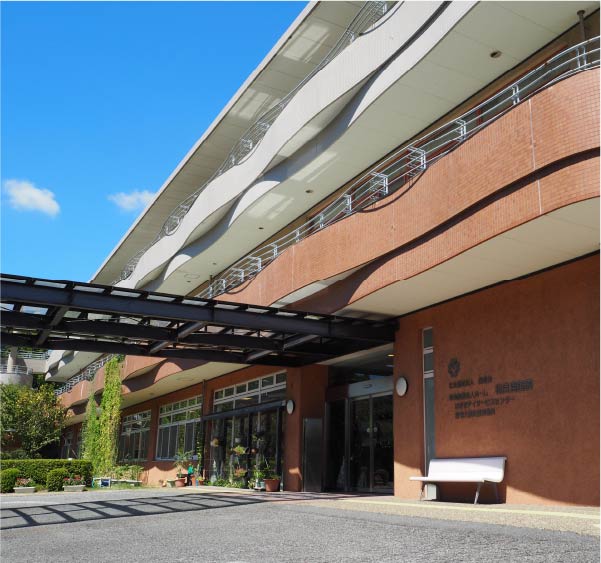
Elderly Welfare
695-6 Nishi-Hagima, Makinohara-shi, Shizuoka
- Facilities
-
Intensive-Care Nursing home with 50 beds (opened in 2001)
Short Stay: 20 beds
Day Service Center: 49 people/day
General Patients: 30 people/day, Dementia Patients: 12 people/day, Preventative Patients: 7 people/day
Food Delivery Service
In-Home Care Support Office
Helper Station
- About the Facility
-
Sagara Seigu-en was opened in July 2001. It was established as the first intensive-care nursing home in Sagara (now Makinohara) and is a facility with 50 intensive-care beds and 20 short stay beds.
Under the guidance of a dental hygienist, Sagara Seifu-en endeavors to improve oral care to prevent aspiration pneumonia. We also hold workshops and training sessions for all staff members focused on their respective departments. In consideration of our staff members' home lives, we are working to improve quality and skills by conducting the same training multiple times.
Our day service respects the home life of each patient and tries to provide smooth services while taking into account the needs of their family. Club activities such as haiku poetry, flower arranging, calligraphy, ink painting, and illustrating postcards are operated by volunteers and are quite well received.
At the helper station, we ascertain our patients' wishes in detail and bear these in mind by drawing close to them while caring for them.
Our in-home care support office is often chosen as a practical training location for acquiring care management qualifications, and, as a contact point for social welfare councils and local welfare officers, actively accepts difficult cases.

